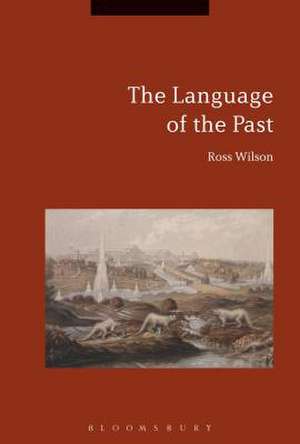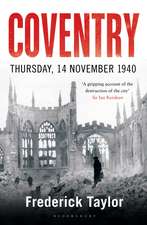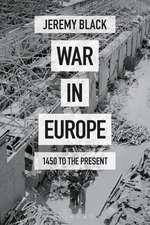The Language of the Past
Autor Prof. Ross Wilsonen Limba Engleză Paperback – 24 ian 2018
| Toate formatele și edițiile | Preț | Express |
|---|---|---|
| Paperback (1) | 238.84 lei 43-57 zile | |
| Bloomsbury Publishing – 24 ian 2018 | 238.84 lei 43-57 zile | |
| Hardback (1) | 593.12 lei 22-36 zile | +28.96 lei 5-11 zile |
| Bloomsbury Publishing – 13 iul 2016 | 593.12 lei 22-36 zile | +28.96 lei 5-11 zile |
Preț: 238.84 lei
Preț vechi: 306.32 lei
-22% Nou
Puncte Express: 358
Preț estimativ în valută:
45.72€ • 47.02$ • 37.93£
45.72€ • 47.02$ • 37.93£
Carte tipărită la comandă
Livrare economică 17 februarie-03 martie
Preluare comenzi: 021 569.72.76
Specificații
ISBN-13: 9781350058057
ISBN-10: 135005805X
Pagini: 256
Ilustrații: 10 bw illus
Greutate: 0.42 kg
Ediția:NIPPOD
Editura: Bloomsbury Publishing
Colecția Bloomsbury Academic
Locul publicării:London, United Kingdom
ISBN-10: 135005805X
Pagini: 256
Ilustrații: 10 bw illus
Greutate: 0.42 kg
Ediția:NIPPOD
Editura: Bloomsbury Publishing
Colecția Bloomsbury Academic
Locul publicării:London, United Kingdom
Caracteristici
Details the array of references, metaphors and allusions to the past that are present within Anglophone countries to demonstrate how history is talked about in contemporary society
Notă biografică
Ross Wilson is Professor of Modern History and Public Heritage at the University of Chichester, UK. He is the author of Representing Enslavement and Abolition in Museums (2011), Landscapes of the Western Front (2012), Cultural Heritage of the Great War in Britain (2013) and New York in the First World War: Shaping an American City (2014).
Cuprins
Introduction 1. Speaking about the Past 2. Prehistoric 3. Ancient 4. Medieval 5. Modern 6. Conclusions NotesBibliographyIndex
Recenzii
We live in a world of dinosaurs and cavemen, of barons and peasants; our cities include Babylon and Rome, and our moral codes extend from the Victorian to the lawless Wild West. Or rather, as Ross Wilson demonstrates in this fascinating study, we lament that we do so, for metaphors and allusions to history constantly bubble through public life as a primary mode of condemning unwanted aspects of the present. This practice embodies the utopian conceit at the heart of modernity-- that the present stands utterly divorced from the past. But it also allows history to creep back in, for it furnishes a language of criticism.
In The Language of the Past Ross Wilson offers a wide-ranging survey of the multiple ways in which people in Britain and the United States since the eighteenth century have spoken about various past times - ancient, medieval and early modern - as a form of self-reflection about the nature of modern society and as a means of differentiating the present from past. Focusing on popular rather than academic discourse, he argues that it is this "language of the past" which functions to create a "double-consciousness" of past and present that marks the advent of the modern age as an era of progress. The book will be of interest to anyone concerned with the ways in which perceptions of the past serve to establish and maintain contemporary identities and, ultimately, generate a vision of the future.
.A powerful, conceptually well-informed and significant study. . . The author establishes a model for a persuasive study of the relationship between understandings of the past, and its claimed significance for the present. The chapters expose the subtle linguistic battlefields over the usage of words by politicians, commentators and the media to frame and valorise acts of historical commemoration, heritage, and persisting values. . . Importantly a case is made for establishing how the vocabulary and associated historical assumptions continue to underpin contested conceptions of modernity. This [book] ought to be very profitably read by academic historians, undergraduates, especially politicians, and the wider public. It again establishes how important conceptions of the past (and getting them right) is an urgent issue for our contemporary world.
In The Language of the Past Ross Wilson offers a wide-ranging survey of the multiple ways in which people in Britain and the United States since the eighteenth century have spoken about various past times - ancient, medieval and early modern - as a form of self-reflection about the nature of modern society and as a means of differentiating the present from past. Focusing on popular rather than academic discourse, he argues that it is this "language of the past" which functions to create a "double-consciousness" of past and present that marks the advent of the modern age as an era of progress. The book will be of interest to anyone concerned with the ways in which perceptions of the past serve to establish and maintain contemporary identities and, ultimately, generate a vision of the future.
.A powerful, conceptually well-informed and significant study. . . The author establishes a model for a persuasive study of the relationship between understandings of the past, and its claimed significance for the present. The chapters expose the subtle linguistic battlefields over the usage of words by politicians, commentators and the media to frame and valorise acts of historical commemoration, heritage, and persisting values. . . Importantly a case is made for establishing how the vocabulary and associated historical assumptions continue to underpin contested conceptions of modernity. This [book] ought to be very profitably read by academic historians, undergraduates, especially politicians, and the wider public. It again establishes how important conceptions of the past (and getting them right) is an urgent issue for our contemporary world.








